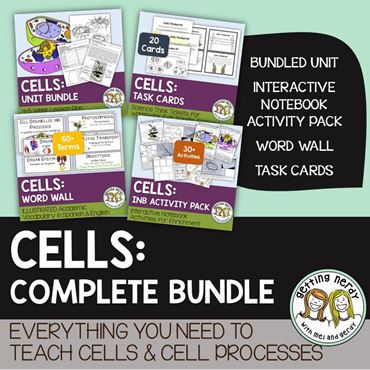
GN1005
Price: $90.25
You’re ready to teach with this comprehensive bundle on cells. Engage your students with animated PowerPoints and 4–5 weeks of aligned lessons covering the following topics:
Complete bundle includes:
MS-LS1-1. Conduct an investigation to provide evidence that living things are made of cells; either one cell or many different numbers and types of cells
MS-LS1-2. Develop and use a model to describe the function of a cell as a whole and ways parts of cells contribute to the function.
MS-LS1-6. Construct a scientific explanation based on evidence for the role of photosynthesis in the cycling of matter and flow of energy into and out of organisms.
MS-LS1-7. Develop a model to describe how food is rearranged through chemical reactions forming new molecules that support growth and/or release energy as this matter moves through an organism